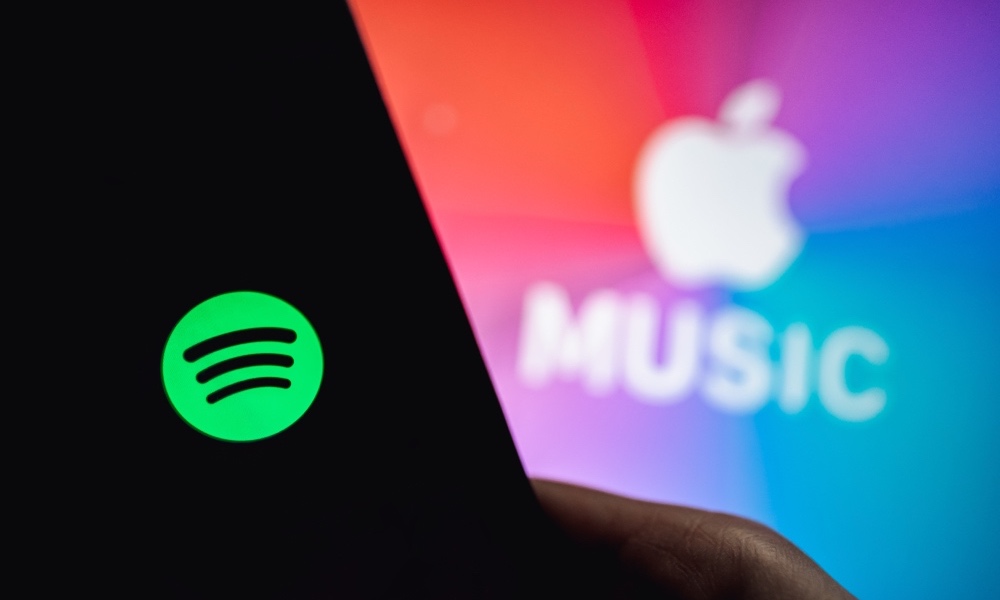Apple May Soon Be Hit with a $539 Million Fine for Stifling Spotify
 Credit: nikkimeel / Shutterstock
Credit: nikkimeel / Shutterstock
Toggle Dark Mode
At least one battle in the long-running war between Spotify and Apple may be coming to a resolution, with the European Commission (EC) reportedly about to rule in the Swedish streaming service’s favor — and impose its first fine on Apple.
It’s expected to be a hefty one, too. Sources speaking with The Financial Times have revealed that the EC is expected to announce a penalty to the tune of €500 million (approximately $539 million USD) as a result of a decision that Apple has abused its platform to favor its own service and stifle competing services.
Naturally, the services in question are Apple Music and Spotify, and the decision stems from Apple’s restrictive App Store policies that not only levy a hefty “Apple tax” on in-app purchases but also Apple’s controversial “anti-steering” provision that prevents third-party developers from even telling their customers that alternate payment options exist.
While this is far from Spotify’s only complaint against Apple, it’s the crux of its bad-faith argument against the company. It’s also the reason that the European Commission has tabled its Digital Markets Act (DMA), effectively forcing Apple to open up app distribution in Europe in an unprecedented manner.
Spotify filed its complaint against Apple in 2019, alleging that the need to pay Apple a 30% commission on all in-app subscriptions would force it to either raise its fees or cut into its profits — and that this is something Apple Music doesn’t have to face, thereby giving it an unfair home field advantage on the iPhone.
The Commission will say Apple’s actions are illegal and go against the bloc’s rules that enforce competition in the single market, the people familiar with the case told the Financial Times. It will ban Apple’s practice of blocking music services from letting users outside its App Store switch to cheaper alternatives. Javier Espinoza, The Financial Times
While some subscription services like YouTube have no problem raising their prices — a YouTube Premium subscription costs approximately 30% more in the YouTube app on your iPhone or iPad than it does when subscribing directly on the web — Spotify has decided it wants none of that. Instead, the streaming provider has decided to avoid the whole question entirely, pulling in-app purchases from its app years ago. As a result, the only way for an Apple user to subscribe to Spotify is on the web.
However, this is where Apple’s “anti-steering” provisions come in since Spotify can’t even inform users that this is an option. Somebody who downloads the Spotify app will be left wandering around trying to figure out how to get Spotify Premium, with no information anywhere that directs them to a web page or tells them such an option even exists. Netflix has followed a similar path with the same consequences for potential subscribers.
Granted, these two streaming giants can get away with this since most people download the Spotify and Netflix apps because they already know about the services — and probably already subscribe to them — rather than discovering them for the first time on the App Store.
It’s a much more challenging problem for smaller developers, and some have a harder time even qualifying for an exemption, which is technically only available to what Apple calls “Reader” apps — a term that encompasses most forms of media consumption, including video and audio streaming.
The anti-steering rules were the one area where Apple lost badly in the Epic Games case, even though it won on every other count, and Apple has been forced to relax its rules slightly. However, that only happened in late 2021, and none of that changes the fact that Spotify had to live under the old rules for years before that. Spotify is also still at a disadvantage against Apple Music since even if it could link directly to an alternative payment page (which it still can’t), that’s not nearly as seamless as pushing a button and subscribing directly through an in-app purchase. Spotify can do that, of course, but only if it’s willing to give Apple 30% of its subscriber revenue.
Since the EC has yet to announce its decision, it’s not entirely clear how this will affect Spotify going forward. The streaming company was previously very optimistic that the EU’s DMA would allow it to begin offering in-app subscriptions without paying Apple, but that was seemingly wishful thinking on its part; when Apple announced its new European app distribution rules, they lowered Apple’s fees, but also add a per-app installation fee that could cost Spotify substantially more, thanks to its millions of free users that don’t pay the company a dime. Unsurprisingly, Spotify vociferously opposed Apple’s new plans, calling them a “blatant disregard of the very principles” the European Commission “worked so hard to establish.”







